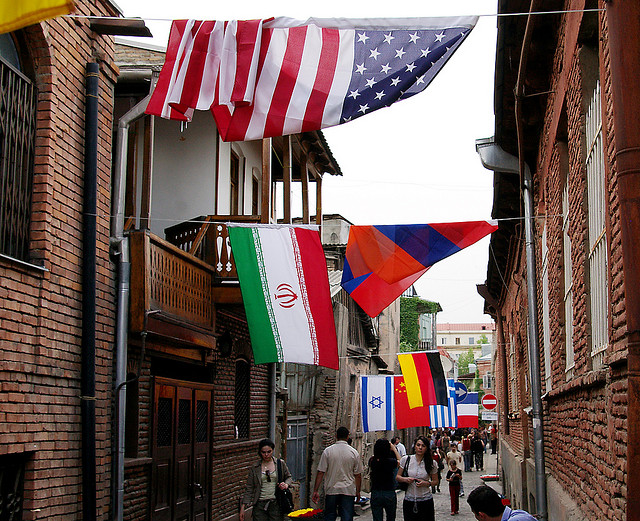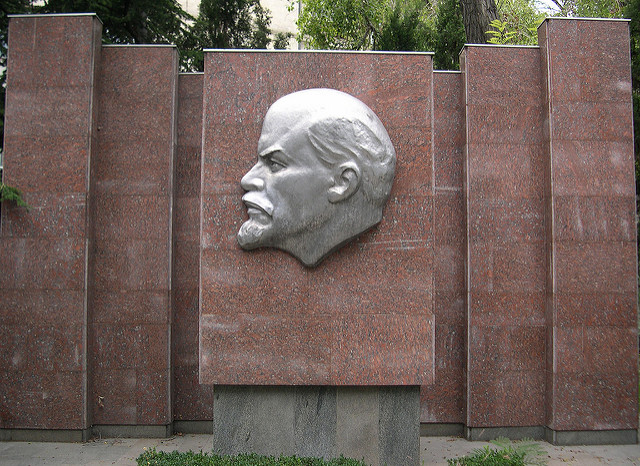Makuna is a 35 year-old self-made entrepreneur, running a cozy little shop in Tbilisi’s busiest tourist area. For several years, her idea to create unusual jewelry, clothes and original souvenirs blossomed into a lovely business, giving her plenty of time for herself and family, and as a steady income.
She said she would never find herself sitting in an office. Her kids, two dogs and an elderly mother would need her all the time. Her little business was perfect. The shop was flooded with tourists from Armenia, Azerbaijan, Iran, Poland, Egypt, Iraq and China almost every day. Georgian cuisine generates a shopping appetite afterward, she used to joke.
She was a staunch supporter of the current government, the “Georgian Dream” coalition, which has completely changed the country’s image and course since its 2012 victory over Mikheil Saakashvili, and his government’s Western-style nine-year rule.
Georgians are more relaxed now when it comes to its tense relations with neighboring Russia. It’s a far cry from the Saakashvili period, and its aggressive anti-occupation policies. The present government does not complain about our neighbor as much. This approach is helping wounds from the 2008 war with Russia to heal. We are patient on NATO plans, and cautious on the EU and its market.
Don’t get me wrong. Georgia wants it all, but at its own pace. Is it realistic?
So, when Makuna noticed that her shop was getting emptier as the days went by, that her income had fallen sharply, that her rent had doubled, and that Georgia’s currency had devalued at least 30 percent, she grew worried.

Unlike the previous government, which led an aggressive tourism programme, and promoted it on the world’s leading media channels, the current government suddenly revoked visa-free rules for Iranians in July 2013, after already tightening its migration and visa policies.
The move was criticized by the opposition, saying it would hurt the economy. However, the public, which was already quite unwelcoming towards the large influx of aforementioned Iranians, as well as Indians and Egyptians, was nonetheless surprised by the consequences.
Georgia’s economy is largely dependent on visitors, investment and remittances. Money transferred from abroad in 2014 declined by 2.45% year-on-year to USD 1.44 billion, accounting for about 8.7% of country’s GDP, according to statistics.
Meanwhile, exports declined, and the number of visitors was lower than the same period last year. FDI grew in 2014, though no new large investors came in.
In contrast, foreign visitors reached 5.4 million in 2013, but were taken with skepticism and comments, such as “Who are these people?” and “Why do they come here?”
At the same time, a new law on the ownership of agricultural land, imposing a moratorium on the sale of real estate to foreigners, created another source of disagreement inside the country.

None of it made sense, economically, or culturally. Living in Tbilisi, you would see foreigners, both working, and spending money, staying for 360 days without a visa – plenty of time to adjust to the free life of the capital, and Georgia’s other cities.
There are endless individual cases written, and articles in the foreign media, about the reasons behind the influx of foreigners. None of it matters now, as visa-free stays have been reduced to 90 days.
Georgia’s Minister of Justice, Thea Tsulukiani, expressed concern over the visa reform, saying that, “It has caused a decline in the inflow of tourists by 42,000 people in the last four months of 2014 – Chinese, Iraqis, Iranians, and Egyptians.” Citing the need to put them in line with Georgia’s visa liberalisation action plan with the EU, she also hinted on the “possible” success expected at the [Eastern Partnership] Riga Summit.
Makuna was quick to reply to this statement:
“Those 42,000 missing are my customers. They are those visitors who did not buy our goods, did not rent apartments, did not spend on our economy, right?” she said.
She was not the only one who was offended by the policy change. The Iranian embassy in Tbilisi called it “unprofessional and unthoughtful.” Regarding Iran and its citizens, it’s important to remember that Tehran supported Georgia during its struggle for independence from Moscow, and the years that followed.
Others simply call the policy, “xenophobic and clearly discriminatory,” especially Tbilisi-based human rights organizations and advocates, and think tanks.
“The revised visa regime steps directly from Georgia’s adoption of an Association Agreement with the European Union. While the agreement does not demand specific restrictions on free movement from individual states, it does demand Georgia align its migration policies with accepted EU standards,” said Daniel Hamilton, a London-based consultant on European Union affairs.
But what we see in reality is an endless number of foreigners, including other EU nationals and American citizens, let alone the “suspicious” activity of Iranians, trying to meet the visa change deadline.
Many such families I know, of mixed nationalities, who work here, and have lived in Georgia without any hassle until now, have been forced to secure residence permits.
My husband was lucky. He has been married to a Georgian for 16 years, but not everyone is. Why should this become a necessity in order to settle in this beautiful, blessed country, which had been open for much needed business and tourism for so many years? “Unfriendly” policies hurt Georgia’s tourism-dependent economy.
Photographs courtesy of Susan, michiexile, and Simon Desmarais. Published under a Creative Commons license.





